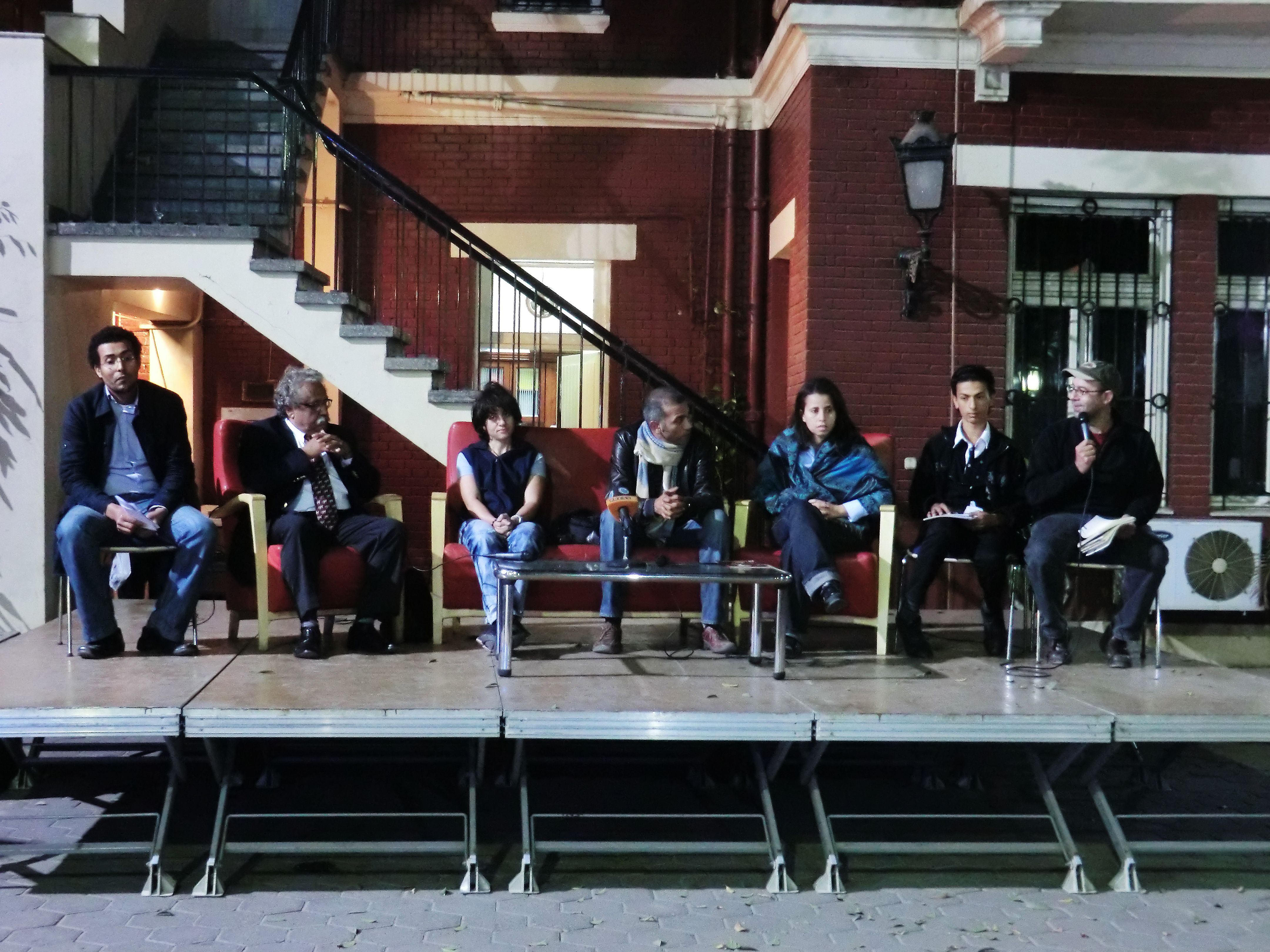Holding those in power accountable lies at the core of good journalism. In Egypt, it helped lead to the toppling of the autocratic regime of Hosni Mubarak and, in a revolution still underway, it continues to foster growing discontent against the military council that came to power in his stead nine months ago.
Yet, those at the forefront of exposing government abuse in Egypt are not the so-called professional media—reporters working for newspapers, TV or radio—but rather citizen journalists who first broke through barriers of media silence, both government-imposed and self-enforced. From documenting police brutality and crackdowns on dissent, to the simple act of chronicling dissent itself, citizen journalists have paved the way for traditional media to follow. This argument was at the heart of a panel discussion on 'freedom of expression and the press' at the Goethe Institute in downtown Cairo earlier this week.
"It's the new media, the people's media, that exposes the truth," said Hany Shukrallah, the editor of Ahram Online, during his address.
When at least 27 people were killed in a military crackdown on a Coptic protest in front of the state TV and radio building known as Maspero on Oct. 9, it was the protesters and their supporters who captured much of the chilling video footage that shows armored personnel carriers plowing into crowds of demonstrators. The footage was used to counter the military council's blanket denial of wrongdoing in the days that followed.
The same goes for the torture of detainees inside the Egyptian Museum at the hands of military police in the first few weeks of the Supreme Council of Armed Forces' rule. The abuse was first exposed online by protesters and activists and largely ignored by the established media. It was only after extensive documentation by citizen journalists that a few press outlets ran the story. "New media has become the original source of the story," Shukrallah said.
This is not a new phenomenon. In 2004, as street protests against the Mubarak regime began to grow in frequency, activists began to upload pictures and video online and post written accounts on a regular basis to document their dissent. Bloggers also began posting grainy footage of police abuses that quickly began to circulate on the web.
"When us bloggers began to post videos, that gave courage to traditional journalists to cover the story as well," said panelist Hossam El Hamalway, a journalist and activist with the Revolutionary Socialists who runs the popular "3arabawy" blog. Rather than report the abuse directly, and put themselves at the risk of arrest or government intimidation, newspaper journalists would cite bloggers who posted the videos, thus absolving themselves of direct responsibility for the story, Hamalaway said. "Alternative media is used by the traditional media so the news can reach tens of millions of people in this way."
One of Egypt's pioneer bloggers during this period was Alaa Abdel Fattah. In 2004, he, along with his wife Manal Hussein, created the blog aggregator "Manalaa.net", which would grow to receive wide acclaim. In 2006, Abdel Fattah was arrested during a period of protests in solidarity with Egypt's independence judiciary movement and was imprisoned for some 45 days. Five years later, Abdel Fattah is behind bars once again, this time on charges of inciting violence against the military at Maspero. He was summoned before a military prosecutor on October 30, but refused to recognize the legitimacy of his interrogators or answer their questions. As a result, he was ordered to be held in custody for 15 days, a period that has been renewed once already. His jailing has sparked a worldwide campaign for his release and has reenergized the movement against military trials for civilians. Since the revolution began, human rights groups estimate more than 12,000 civilians have been tried in military courts.
Abdel Fattah's father, the human rights lawyer Ahmed Seif Al Islam, took part in Monday's panel discussion. "Alaa and others were arrested to send a message," he said. "We will send an opposing message: We will not be silent about the military's crimes." Seif Al Islam urged the audience to take part in mass protest planned for Nov. 18. "We must come together tell the military council: 'No, we stand against you.'"
Also at the talk was Mark Nabil, the brother of Maikel Nabil, a blogger who is serving a three-year prison sentence after a military court on April 10 convicted him on charges of insulting the armed forces and publishing false information for a blog post he wrote titled, "The people and the army were never one hand." Maikel has been on hunger strike since Aug. 23—more than 80 days—to protest his imprisonment. Living solely on juice and milk he is suffering serious kidney and liver problems.
"We need to talk about freedom of expression and choice for all people, not just the press," said Dina Samak, a journalist with Ahram Online. When people use alternative media, such as Facebook, Twitter, graffiti and street art, to express themselves and push the boundaries of dissent, journalists become unmuzzled and follow suit, she said. "The only solution and hope we have is the people's media."
After the panel discussion ended, audience members were invited to take part in a brief comment session. One young journalist, Mohamed Abdelfattah, strode up to the microphone and relayed a quote by a senior Egyptian intelligence official likening journalists to spies. Abdelfattah concluded by delivering what was perhaps the most memorable line of the evening, one that succinctly defined what journalism was all about.
"Yes, we are like spies," he said. "The difference is, they get information on people and give it to those in power. We get information on those in power and give it to the people. Let's keep on spying and keep our hands in their pockets."
